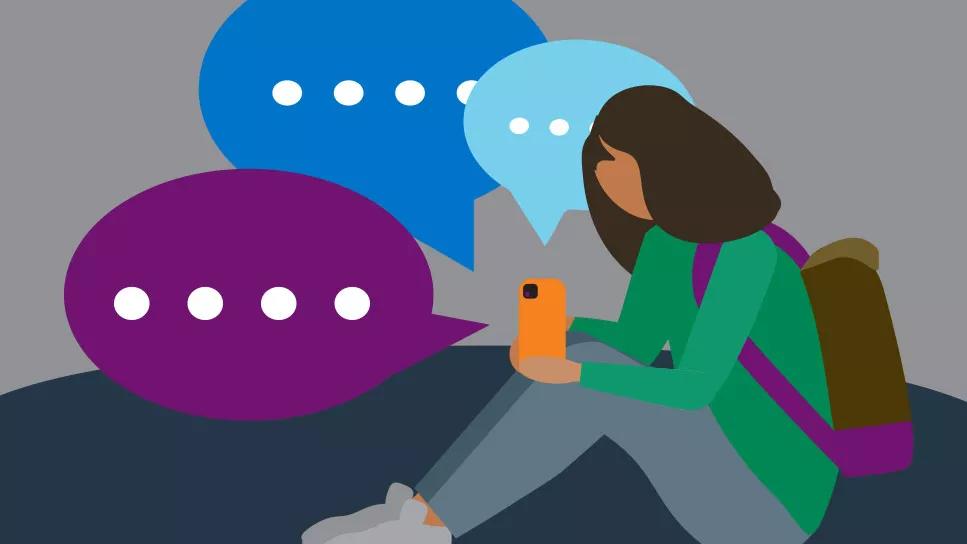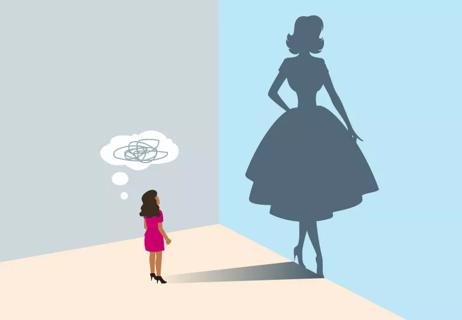Foster communication about social media, encourage whole-person attributes and be mindful of your own negative self-talk

In the era of gym selfies and social media filters, we’re flooded more than ever with messages about how we “should” look.
Cleveland Clinic is a non-profit academic medical center. Advertising on our site helps support our mission. We do not endorse non-Cleveland Clinic products or services. Policy
That exposure can be especially tough for adolescents, who are experiencing dramatic changes in their bodies at a time when they’re also developing their values and self-concepts. All adolescents can experience dissatisfaction with their body image, though adolescent girls tend to report this at higher levels.
Psychologist and body image researcher Leslie Heinberg, PhD, explains how body image issues can affect young kids and adolescents, as well as how to help them maintain a good self-image.
Whether we notice it or not, children begin to absorb society’s pressures to appear a certain way. And this awareness starts to happen younger than you may realize. A 2016 survey of childcare workers found that children displayed body confidence issues as young as 3 years old.
Here are some factors that can affect a child’s body image:
Height, weight, body composition, sex characteristics — they’re all changing as children mature.
Particularly for young girls, a lot of changes occur that drastically alter their view of themselves. A 2015 study found that young girls who mature even earlier than their peers may be especially vulnerable to developing a negative body image.
“Research has shown for decades that for girls, being early bloomers is a risk factor for body image disturbance, eating disorders, obesity and psychological difficulties,” Dr. Heinberg shares. “They get a lot of unwanted attention, and they don’t fit in with their peers at a time when adolescents want to be just like everybody else.”
In addition, hormonal changes can play a role in how children view their own bodies — no matter their sex or gender. In particular, weight gain and muscle development can be something that causes kids to view themselves in a new light.
“Other factors, such as gender identity, may bring attention or point to feeling different from their peers may cause body image concerns,” Dr. Heinberg adds.
Whether they’re being teased about their appearance or critiquing a classmate’s new outfit, adolescents — and the way they think about their own appearances — are greatly influenced by peers. That’s troubling because social comparison is linked to higher levels of body dissatisfaction.
And this influence from peers is magnified even more through the use of social media. These days, they don’t have to be face to face with each other in school to feel insecure or to receive comments from other kids their age.
It’s also troubling because teens who are teased about their weight are more likely to develop obesity as adults, struggle with their body image and develop unhealthy eating behaviors.
Kids can get the wrong message about their own bodies from an array of sources, but there are ways to work against these pressures.
Here are some tips to help your child develop a positive body image:
The impact of social media on body image is a burgeoning area of research. A 2018 study Dr. Heinberg worked on uncovered that college-aged women in four Western countries felt the most pressure to be thin from what they saw in the media, which includes traditional media and social media.
A more recent 2022 study echoed a similar finding: The curse of comparison can cause adolescent girls in particular to feel inadequate about how they view themselves.
“When somebody posts a selfie, that teenager may take 15, 30 or even 40 pictures and then pick the one where they look best. They likely use a number of filters to alter the image. But then, everybody else is doing social comparison and thinking, ‘She’s so beautiful,’ or ‘She’s so thin — why don’t I look like that?’” Dr. Heinberg says. “That’s reinforcing unrealistic expectations.”
One way to counteract this is to limit your child’s screen time — something that will definitely have other health benefits as well. But the reality is, social media is often a part of your teen’s life, so it’s also important to face the issue head-on and talk to them about what they’re consuming and how they’re interpreting it.
Sometimes, even the smallest comments can make a difference in how a child feels about themselves. And this can happen when parents say something that they don’t intend to come off as negative. This is because our society often equates “physically attractive” with “morally good.”
Of course, this doesn’t mean you can’t compliment your child’s or other people’s appearances. But make sure that’s not the only positive admiration you’re showing them, so they understand that their looks are only a part of their self.
For example, try to put less emphasis on appearance in your home and prioritize being healthy and strong instead. Talk about eating vegetables and exercising to help them get healthier and feel better, rather than look better. More importantly, focus on attributes that they manage — like being kind or being a hard worker — rather than ones associated with appearance or body weight.
“Do I look fat in this?” It might seem like a harmless question, but overhearing a parent criticize their own body can reinforce your child’s belief of a thin ideal. In a 2018 study, young women who overheard “fat talk” within their families were less likely to eat mindfully and appreciate their bodies.
“Children model what we do,” Dr. Heinberg notes. “If you’re telling your kids that they’re beautiful just the way they are, but then they hear you constantly talking yourself down about your own body, that’s a very big mixed message.”
The most fundamental thing parents can do to help their kids build a healthy body image is to make home a safe place that’s judgment-free for both kids and parents, Dr. Heinberg says. Talking about the images and messages kids see in the media is another good step.
“I think taking time to watch TV, TikTok or YouTube videos together can help kids become good, smart consumers of media,” Dr. Heinberg says. Try and point out certain things in media that are clearly edited or unrealistic — this will help them understand the context.
“It can be helpful to look at images together and talk about how things are digitally altered or how someone had their makeup done professionally so they don’t set unrealistic standards for themselves,” she adds.
Body image is an important topic to bring up with your child. Start simple conversations early and continue them as your child grows. Along the way, try to model for them ways to have a good body image. Help your child see their body in a balanced way, and put an emphasis on growing in a strong and healthy way, without comparing themselves to others or putting unnecessary pressure on themselves.
Learn more about our editorial process.

Like being your own best friend in times of trouble, self-love is an act of self-preservation

It may feel impossible, but planning, motivation and goal-setting can make leaving old habits behind doable

‘Blackout rage gallons’ promote unsafe drinking behavior

Get to know the resources they have on and off campus, including their friends

Filters and editing can lead to low self-esteem, depression and even body dysmorphic disorder

People-pleasing, perfectionism and putting others first are all signs of this harmful behavior

Being occasionally self-indulgent has mental and physical benefits

The vagina is full of healthy and unhealthy bacteria, so discharge can be normal or problematic

Your metabolism may torch 1,300 to 2,000 calories daily with no activity

A gentle touch in all the right places may help drain your sinuses